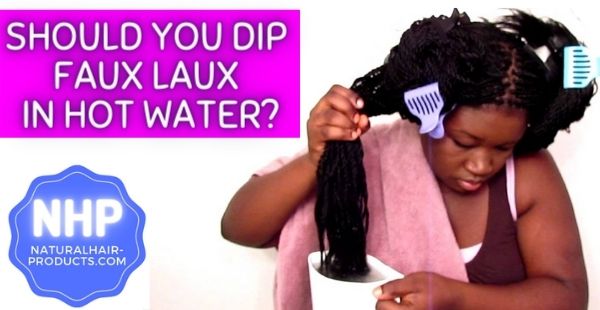Dipping Faux Locs In Hot Water [Seal & Keep from Unraveling]
- NHP
- Natural Hairstyle Ideas
- Loc Styles
- Dipping Faux Locs in Hot Water
Why are so many gorgeous girls dipping faux locs in hot water? Well, YOU GON’ LEARN TODAY! **Kevin Hart Voice**
- Different reasons and ways to use hot water on your faux hair
- How to soften stiff faux locs
- How to keep faux locs from unraveling
- How to seal faux locs
These are quick Black hairdo hacks to fix faux locs stiffness, loosen them up and give them a more natural look and feel. This can also work for box braids, twists or anything involving high quality Kanekalon loc hair or premium-grade Marley hair.
Also…
Even though hot water is a decent sealant and helps keep the loc hair in place and less frizzy…
,,,I’m gonna keep it real with you and let you know if you should should use dipping faux locs in hot water as the best way to seal locs or if burning with fire is better.
You may be surprised!
Let’s get to it sis! NHP is gonna break it down for ya…
2 Different Reasons For Dipping Faux Locs In Hot Water
Don’t get it twisted, not every hot girl is dipping faux locs in hot water for the same reason…
And the temperature of the hot water determines what the end goal is.
- When non-boiling hot water is used on the length of the hair, this is done to loosen and soften stiff faux locs. THIS IS A GREAT TECHNIQUE!
- When boiling water is used on hair ends, stylists are dipping faux locs in hot water to seal the ends to keep them from unraveling.
Still though, for anyone who wants to know how to keep faux locs from unraveling dipping them in hot water may not be your best option.
[RELATED ARTICLE: See BOMB Crochet Faux Locs for Summer]
How To Seal Faux Locs Without Dipping Faux Locs In Hot Water
What do you seal faux locs with? There are multiple ways you can seal faux locs—try using a good flat iron or styling product to keep them in place.
Trying dipping faux locs in hot water isn’t the best way, a better (more fun) way to seal faux locs is to use fire.
Pro stylists use lighters on synthetic hair as long as they're sure they've wrapped the hair completely. Check out these routines for how to seal faux locs:
1. Wrapping Method
Here’s how to seal your faux locs by wrapping: Once you get to the very end of wrapping your faux locs you're going to want to have a certain amount of hair left and then wrap the opposite direction, wrapping up, and then wrapping down. After that, you just palm roll the crochet faux locs and POW that's it!
Also: Success in sealing your faux locs by wrapping depends somewhat on the brand of crochet hair you use.
Some Marley hair and kinky afro hair is kinkier than other faux loc hair brands and the extra kinky texture actually helps with tangling itself around the locs with a tighter grip to help in sealing ends and keeping your faux locs from unraveling.
SEE THIS FAUX LOC SEALING METHOD PERFORMED HERE:
2. Super Glue or Nail Glue Method
Many professional stylists who know how to seal faux locs love using super glue or nail glue to seal the crochet hair faux locs like nobody’s business!
To seal, you want to wrap down to the faux loc ends and wrap a couple of times in the opposite direction leaving you with a few flyaway strands and then before you wrap the rest of those flyaway strands around you’ll put a speck of super glue or nail glue on that end area of the locs.
Then you wrap the hair strands around that superglue and then you palm roll the ends, this helps faux locs last longer than you think.
This is a super popular method for sealing crochet faux locs and keep them from unraveling without dipping faux locs in hot water.
SEE THIS FAUX LOC SEALING METHOD PERFORMED HERE:
3. Dipping Faux Locs Ends In Boiling Hot Water To Seal
Dipping faux locs in hot water that is boiling is not only a somewhat dangerous way to keep faux locs from unraveling, but it’s not the most effetive method of sealing faux loc ends.
You can easily burn yourself by tipping the boiling pot over by mistake or even have the hot water swing from your crochet faux locs onto your body when you stand up after dipping.
NHP strongly recommends using ANY of the other faux loc sealing methods on this list before dipping faux locs in hot water.
4. The Rubber Band Method
This is a method that a lot of people do not use because it can be noticeable.
When using rubber bands to seal faux locs you just wrap downward like you're doing a normal faux, once you get to the end you kind of wrap the tail end back up onto itself and then you put your rubber band around the end of it and cut the flyaways.
Here’s the catch:
Although this is probably the most secure method to keep faux locs from unraveling, it doesn't really give you that natural ending or look that you want for you ends.
Sure, from far off people can't see the rubber band in your hair, but as they get closer, close enough to examine your faux locs, they'll be able to see the rubber bands. It’s not the natural dreadlocks look you want.
SEE THIS FAUX LOC SEALING METHOD PERFORMED HERE:
5. Knotting The Ends
A great way to seal and to keep faux locs from unraveling is to knot the ends of your faux locs. This is a very common sealing method amongst faux lockers.
You need to wrap the hair around until you get to the end and are left with a little piece of stringy strands on the ends of the faux locs. Then you make a slip knot and tighten, this is very simple method once you get the hang of it.
The only problem is that you may have a hard time performing this method if you have medium length-to-long nails. Longer nails can make the knotting method hard to execute.
SEE THIS FAUX LOC SEALING METHOD PERFORMED HERE:
6. Burn With Fire (Instead Of Dipping Faux Locs In Hot Water)
Burning locs with direct fire is an extremely common method and far more effective than dipping faux locs in hot water to seal them.
Burning the ends is a pretty straight-forward and simple process, you use a lighter and after you've wrapped it well and palm-rolled it, you’ll then put fire to the end area and burn it, then you’ll immediately palm roll it again while the faux loc hair is still hot. That’s it!
This is an extremely common faux locs sealing method in faux loc community.
Admittedly though, some natural don’t like using this sealing method simply because it tends make your faux locs stick together.
SEE THIS FAUX LOC SEALING METHOD PERFORMED HERE:
NHP PRO TIP: Use one of those long flicker lighters with the long handle instead of the common 75 cent beauty supply lighter. You will save time, energy, and thumb soreness.
7. Flat Iron Sealing Method
Lastly, you can seal faux locs by burning the ends with a flat iron to keep them from unraveling. I’ve posted a video below so you can see this sealing process.
There are mixed reviews about this faux locs sealing method. Some say this sealing method makes the faux locs stick together and others say it doesn’t make them stick together.
The end results probably depend alot of how much heat was used and maybe even which type of flat iron was used. Maybe cheap flat irons give different results than high-quality flat irons.
Either way, it’s definitely a source of heat and kind of like flame burning the the faux locs without actually using a lighter.
SEE THIS FAUX LOC SEALING METHOD PERFORMED HERE:
Additional Tips on How to Keep Faux Locs From Unravelling W/O Dipping In Hot Water
One of the biggest mistakes you can make installing faux locs is trying to extend the coverage of the wrapping hair. This can happen if you have run out of crochet hair, or the braid underneath is too thick or wrapping loosely.
If your faux locs are unravelling at the roots, then you must wrap the Cuban/Marley hair at least six times before proceeding to cover the rest of your braid.
To fix unravelling faux locs hair, push the loose hair up, then spray your locs with a good setting spray.
After that, use a goodflat iron on a very low setting and pat the faux loc to secure them. You can also remove the hair and re-wrap the Cuban/Marley hair back, then use a flat iron to seal the loc.
A good tip to consider is to avoid sealing the wrapping hair on your natural braid, instead, use the flat iron an inch or so from where your natural hair ends.
AGAIN FOR EMPHASIS:
- Leave approx 6-7 inches Cuban/Marley out when you reach the end and wrap up until you have finished the hair. Then palm roll and seal with a flat iron.
- Another option to seal the ends is using super glue after you have wrapped up, then palm roll.
- Overlap when wrapping.
- Use a tight wrapping technique.
- Don’t be alarmed if your faux loc unravels as you can fix them with these simple steps: push the hair up, spritz some quality holding spray and on your flat iron’s lowest setting, pat loc with your straightener.
Join NHP-HIVE and get sent our info-packed, down-to-earth & sometimes funny NHP hair tutorials by email. SIGN UP HERE...
FAQS: Is Dipping Faux Locs In Hot Water After Burning End Recommended?
ANSWER: No, DO NOT both burn after dipping faux locs in hot water, it will be bad I promise you. There are some YouTube tutorials that demonstrate how to do faux locs without burning the ends. Still though, burning them is a commonly used method.
After two weeks at the most they should no longer stick together if you do decide to burn them.
Dipping faux locs in hot water after you’ve burned them is a no-no because it causes the ends to look ratty.
As mentioned earlier dipping faux locs in hot water is a great method for softening faux locs so that they aren’t super stiff anymore, but that isn’t done with boiling hot water.
Using boiling temperatures for dipping faux locs in hot water to seal them is not a good idea, but some folks use the method anyway.
FAQS: What Happens When You Dip Faux Locs In Hot Water?
Can faux locs be dipped in hot water like braids? Yes, for softening stiff and tight-feeling locs. Use hot, but not boiling water. For faux locs done with Kanekalon hair, dipping in hot water is more effective than faux locs wrapped with Marley hair.
For sealing faux locs, burning is a more effective way to seal than dipping faux locs in hot water.
[RELATED ARTICLE: Why Rose Water for Locs Is The Bomb!]
FAQS: Do You Have To Dip Butterfly Locs?
Do you have to dip butterfly locs? The answer is no. You do not have to dip butterfly locs. In fact, Hot water dipping butterfly locs is not an approved sealing method because the distressed locs tend to unravel easier than other faux loc stylings.
FAQS: Can You Dip Marley Hair In Hot Water?
ANSWER: Yes, you can dip Marley hair in hot water. Take note that Marley hair isn’t the same as Kanekalon hair, so you tend to dip it a little differently. Marley hair is very coarse, because of this you need the water to be very hot and you need a thoroughly deep hot dip.
Not just quick 3-second dip, you need to really let the Marley hair sit in the hot water and literally soak up the hot water. Some stylist leave the hair steeping in hot water for a minute or two.
Then when you pull the hair out of the hot water you have to pull on the ends while they are wrapped and compressed inside of a dry towel, make sure to really pull and compress with hand pressure to smooth and slick down the Marley hair because the ends tend to be straggly.
Hey, if you liked this info about dipping faux locs in hot water, sign up to get our NHP hair tutorials in your email for FREE!
Follow Author of Dipping Faux Locs In Hot Water Tutorial...

ABOUT THE AUTHOR: Melissa Lee
Melissa Lee is a Contributing Editor to NHP and a former owner of the BlackhairOMG website. She formed 4C Trichology Growth Services, LLC., a US based hair care consultation service. She has also contributed as a writer and consultant for various hair and beauty websites. Melissa can be followed on Twitter here.
![Dipping Faux Locs In Hot Water [Seal & Keep from Unraveling] Dipping Faux Locs In Hot Water to Seal & Keep from Unravelling.](https://www.naturalhair-products.com/images/xdipping-faux-locs-in-hot-water.jpg.pagespeed.ic.DSBEcDhpOJ.jpg)


